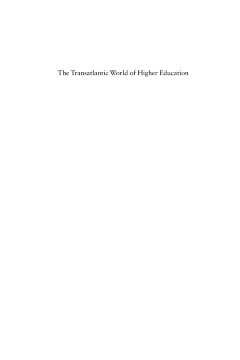
Additional Information
Book Details
Abstract
Between the 1760s and 1914, thousands of young Americans crossed the Atlantic to enroll in German-speaking universities, but what was it like to be an American in, for instance, Halle, Heidelberg, Göttingen, or Leipzig? In this book, the author combines a statistical approach with a biographical approach in order to reconstruct the history of these educational pilgrimages and to illustrate the interconnectedness of student migration with educational reforms on both sides of the Atlantic. This detailed account of academic networking in European educational centers highlights the importance of travel for academic and cultural transformations in nineteenth-century America.
“Anja Werner’s excellent and well written study, complemented by appendices… and names and subject index, offers a central step toward an understanding of the German history of science and its growing international character throughout the 19th century. Of essential importance seems to be the author’s interest in networks, which clearly goes beyond a classic history of a European contribution to American culture or that sees scientific transfer as a process of a complete move without modification and reflection.” · Neues Archiv für sächsische Geschichte
“Academic networking is the prominent theme in this book. Werner provides valuable insights in the form of both statistical data and biographical information and considers a broad range of topics such as gender diversity, ethnicity, sexual orientation, disabilities, economic factors, and even military history… an important contribution to the research of American student life in Germany in terms of personal educational experiences.” · Amerikastudien / American Studies
“Regardless of Werner’s predominant focus on Leipzig, she is to be lauded for the sheer volume and sophistication of her research. In the detailed stories of American life in Germany alone, this study builds upon existing literature, and will be valuable to all who study the transatlantic world in the nineteenth century.” · German Studies Review
“…an important, much-needed, and very welcome study of a significant aspect of nineteenth-century German and American history that is frequently mentioned in the existing literature, yet rarely actually examined.” · American Historical Review
“Werner effectively utilizes a wide range of primary documents, including university records, previously untapped student lists, travel journals, and correspondences by students, professors, and diplomats… [Her book] should be a must read for advanced historiography students but will also be of interest to any historian of transatlantic ethnic studies or the American education system.” · Yearbook of German American Studies
“Academia always benefits from international cooperation. [This volume] delves into the international relationship between America and Europe. Discussing the long period between the establishment of the United States and the start of World War I, Anja Werner compiles a fascinating study of the countless Americans who traveled to Germany to embark on the journey of learning, and what this level of travel can teach people about the world and this worldly education's applications. Scholarly and insightful to this old school way of learning that still lives on, The Transatlantic World of Higher Education is a scholarly addition to history collections focusing on academia and education.” · Library Bookwatch
“The book makes a significant contribution to the scholarship on the history of higher education and revises and corrects many over-simplifications in earlier scholarship.” · John B. Boles, Rice University
“Werner provides finally, through an extraordinary rich effort with great sophistication and archival mastery, a description of the long discussed yet never fully documented attraction that German universities had for the number of Americans seeking research methodological expertise, modern research in the sciences (especially chemistry), or advanced study leading to an earned, research-based doctoral degree, which began at the University of Berlin in 1810 and then elsewhere thereafter in the German lands.” · Lester F. Goodchild, University of Massachusetts Boston, Distinguished Professor of International and Comparative Education
Anja Werner studied at the University of Leipzig, the Université de la Sorbonne Nouvelle—Paris III, and Harvard University. From 2006 until 2009 she was affiliated with Vanderbilt University, where she coordinated the international Alexander von Humboldt in English project, whose annotated, new English translation of the Political Essay on the Island of Cuba was published in 2011. Her latest projects include a multiauthor volume on Black intellectual history in global contexts and research on the Deaf Atlantic World at the Max Planck Institute for the History of Science in Berlin, Germany.
